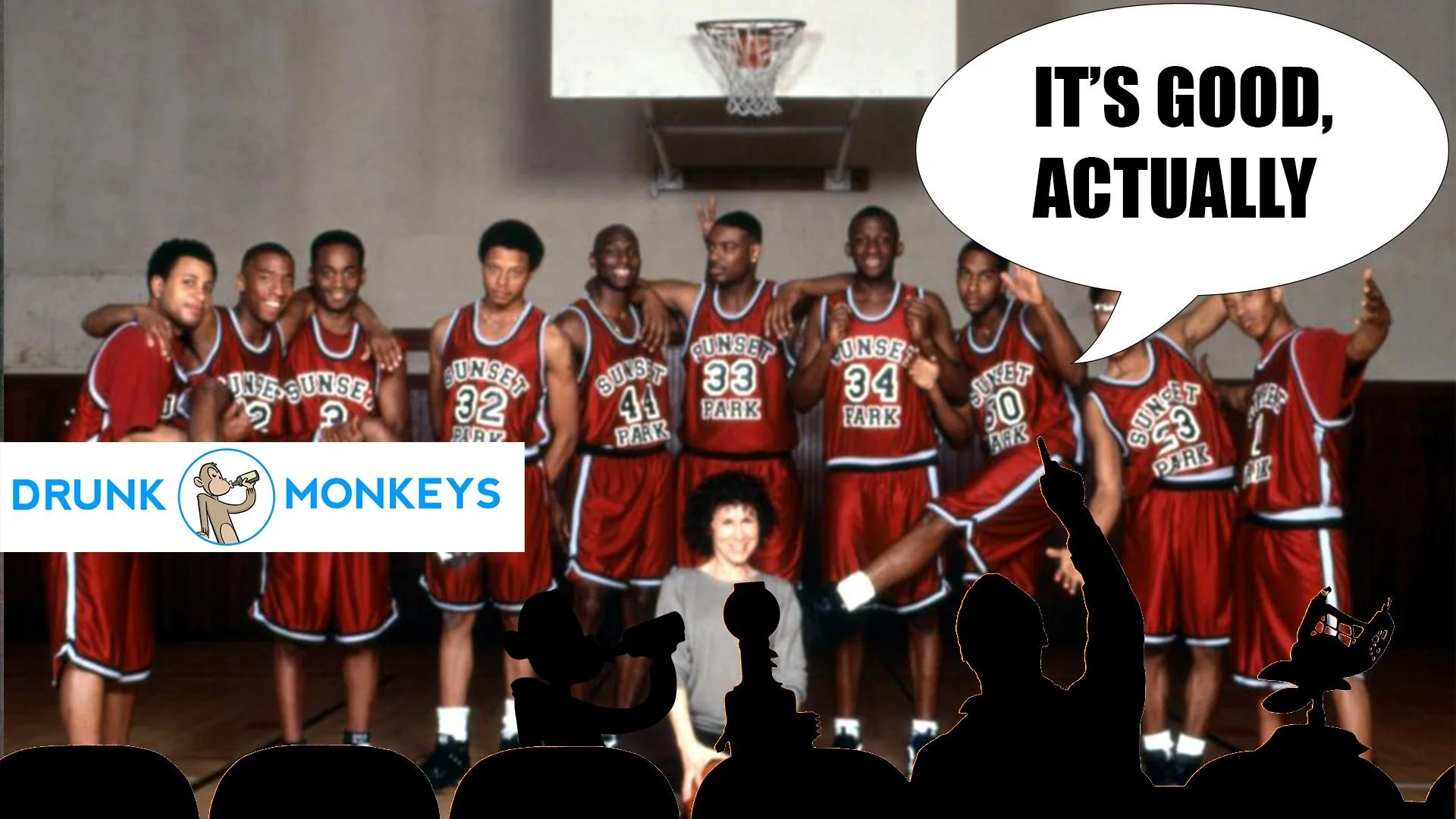If there is a top tier of basketball movies, 1996’s Rhea Perlman-led Sunset Park is not in it. It’s no Hoosiers, the genre’s gold standard, nor does it engage the serious issues inner-city players face with quite the same gravitas as He Got Game, nor is it as novel as Finding Forrester, a great basketball movie exactly because it’s not a basketball movie at all.
Sunset Park falls somewhere below these, a fact that made reviewers cool on it to the tune of a 13% rating on the Tomatometer.
In these reviews, much of the blame is placed on the script and sequencing of the story, something Roger Ebert wrote “seems coached by people who want the job but aren't really prepared for it” in his two-star review. Chris Hicks was a bit harsher. “As it is, this is Stand and Deliver dumbed down, or perhaps a more intellectual Mighty Ducks.”
The key to the “It’s Good, Actually” formula here is what these reviews miss: the quality of a sports movie is determined by how it balances employing and resisting the genre’s plot formulas. In particular, for basketball movies to be good, they must engage and subvert these cliches in meaningful ways. And Sunset Park effectively does this in a few ways.
The premise of the movie is ultimately familiar. A dysfunctional team with potential needs a coach to help them win, something they’ll do only if they’ll let themselves be helped. Conversely, that coach grows to recognize that she needs the team too, an awareness that grows through the adversity and eventual success of the team’s season.
Their shared need is the first of these sports cliches Sunset Park flips in an interesting way, something ironically apparent through one of the movie’s shortcomings: the somewhat inconsistent game-play cinematography.
To be sure, the movie was no Double Dribble or Hank Gathers Story (arguably not just the worst movie depictions of basketball ever, but maybe athletic human movement in general). But if the exemplars were Hoosiers and Hoop Dreams when this film was made, then Sunset Park missed some chances to do more than display the quirks of its characters on the court.
At the same time, the game sequences captured Perlman’s character’s absolute need for her players to teach her a game she knew nothing about, was hired to coach because no one else wanted the job, and initially only represents a paycheck. In most stories like this, the players’ need for the coach vastly outstrips coach’s need for them, something that prevents the players from having any real agency in terms of the non-basketball outcome. Here, the need was parallel, which is in many ways infinitely more interesting even if the premise of the story is not the most original.
This is why Sunset Park is as good or better than Coach Carter and Glory Road (both based on true stories and written in ways that made the coach an outsized presence to the detriment of the players’ storylines). While the basketball feels a bit more real, neither of these films captured the particular balance of the players’ challenges in navigating their world and the role of the game in that process without becoming didactic.
Another element that makes this movie good is the team’s chemistry. Avoiding the twin traps of making the players comically bad or the over-the-top in talent, this collection of actors feel more like an actual high school squad with high school issues than is usually the case. Fredro Starr’s underrated balance of toughness and genuine emotional depth as Shorty carries the movie and acts as an anchor for the development of every other character.
With Shorty at the center, the simple but effective arcs of characters like the insecure but talented Drano (played by Antwon Tanner who later portrayed a high school player in Coach Carter and on the TV show One Tree Hill), the loveable bench-warmer-turned player Busy-Bee, and the problemed but sensitive outsider Spaceman (an up-and-coming Terrence Howard) all play out in satisfying ways.
Sure, the tropes of grades and drugs and girl problems among others find their way into the locker room, and sometimes in hastily developed ways. But the real sense of comradery between teammates that balanced humor and heart made those issues feel genuine, (in some ways more than the teams in Coach Carter or even Hoosiers were able to pull off). And their clear desire Perlman’s mentoring and approval laces every scene.
In fact, I’d argue the way this movie shot the high school experience is one of the reasons it’s worth watching, because the school is neither the stock nemesis of the team’s success nor is it simply a flat backdrop against which it happens. It’s an organic character (save a VERY unbelievable moment in which Perlman’s character physically intimidates another teacher who’s mocking Spaceman).
And finally, the movie is enjoyable because it ends on a loss rather than a win. Not only does this avoid the improbable win cliche, but it also forces characters to make something of the disappointment, an ending that is almost always more compelling than the walk off win.
So, while Sunset Park is an imperfect movie, what it does well definitely makes it good, actually.
Michael Dean Clark is an author of fiction and literary nonfiction whose work has appeared most recently in Foreshadow, Punctuate, Drunk Monkeys, The Other Journal, and The Jabberwock Review among others. Writing from the L.A.-area, follow him on Twitter at @MDeanClark or michaeldeanclark.com.
